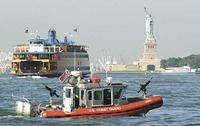-
Norway bans testing of Israel-bound submarines

Israel is buying additional submarines for two purposes: first, move some of its nuclear second-strike capabilities to sea in order to enhance its deterrence posture; second, have more cruise missile-carrying submarines available to position off the Iranian coast for possible attack on Iran’s nuclear weapons facilities; Norway, which is critical of Israel’s occupation of Palestinian territories, has informed the German builder of the Israel-bound submarines that Norway will no longer allow deep-water testing of these submarines in the Norwegian submarine base the German company had leased
-
-
Budget cuts harm cybersecurity in the states, survey says
New survey finds that many states lack sufficient cybersecurity resources; the problem is not just funding: many state CISOs lack the visibility and authority to effectively drive security down to the individual agency level
-
-
Mumbai-like terror attack on European cities foiled
Al Qaeda- and Taliban-affiliated terrorists based in Pakistan planned a Mumbai-like attack on London and other European cities; experts say the plot is believed to have moved from the aspirational stage to actual planning; rather than set up explosives to blow up buildings, the terrorists would have used machine-guns and hand grenades to kill as many people as possible; improved Western intelligence capabilities made Western authorities aware of the plot, and as the organizers of the attack and the militants who were to carry it out gathered in Pakistan for training and last-minute instructions, a barrage of precise missile attacks from CIA drones — some 20 sorties in all — killed many of the plotters and disrupted their preparations
-
-
World unprepared for "convergent crisis"
Specialists in disaster response say that nations are almost completely unprepared for the likely emergence of so-called convergent crises with the potential to plunge markets and regions into prolonged turmoil; in these multi-faceted disasters, strains like a shrinking Arctic ice cap, theft of nuclear materials, oil or water shortages, or cyber crime would worsen tensions among nations over traditional issues such as trade, territory, and resources
-
-
U.S. to make Internet wiretaps easier

The Obama administration plans to submit a bill next year that would require all online services that enable communications to be technically equipped to comply with a wiretap order; this would include providers of encrypted e-mail, such as BlackBerry, networking sites like Facebook, and direct communication services like Skype; federal law enforcement and national security officials say new the regulations are needed because terrorists and criminals are increasingly giving up their phones to communicate online
-
-
Civil wars in Africa have no link to climate change
Some researchers have argued that environmental variability and shocks, such as drought and prolonged heat waves, drive civil wars in Africa; a new paper investigates the empirical foundation for the claimed relationship in detail, and concludes that climate variability is a poor predictor of armed conflict; instead, African civil wars can be explained by generic structural and contextual conditions: prevalent ethno-political exclusion, poor national economy, and the collapse of the cold war system
-
-
U.S. officials: terror threat against U.S. diversifying

The terrorism threat against the United States has evolved, with homegrown terrorists and a greater diversity in the scope and methods of attack making it more difficult to prevent them, top security officials told a Senate committee Wednesday; the number of terrorist attacks against the United States increased in the past fifteen months; Napolitano said the nature of terrorist attacks continues to evolve, with recent attacks coming faster and with “less extensive pre-operational planning than previous attempts and with fewer linkages to international terrorist organizations”
-
-
Russia cancels S-300 delivery to Iran
The Russia-made S-300 is the most sophisticated air defense system in the world, and Iran signed a contract to buy them in order to protect its nuclear weapons facilities; Russia has now decided to abrogate the contract — meaning that Iran’s nuclear facilities remain exceedingly vulnerable to destruction from the air, and that the option of attacking these facilities is less daunting than would have been the case otherwise
-
-
DHS gives New York $18 million for radiation detection system
DHS will hand New York $18.5 million today to keep the city’s prototype dirty-bomb detection system running; the nuclear detection operation is run out of an operations center in the city, featuring more than 4,500 pieces of radiation detection equipment, many equipped with GPS locators
-
-
Privacy-focused alternative to Facebook launched
Four NYU students launch Diaspora — a privacy-sensitive alternative to Facebook; Diaspora is a decentralized social network that lets users control their personal data — photos, friend lists, statuses, etc. — by hosting it on their own computers, or on servers they have access to, which are called “seeds”
-
-
Freed Pope plot suspects may sue police for false arrest

U.K. police and counterterrorism authorities are worried that the six men who were arrested Friday on suspicion that they were plotting to assassinate the Pope during his U.K. visit may take legal action for unlawful arrest and detention; the men, all of North African origin, were released Saturday and Sunday after police admitted there was no evidence of a plot
-
-
Resurgent Irish terrorism on agenda North and South
Irish politicians on both sides of the border say resurgent Republican terrorism is a growing problem; tensions grown as community leaders charge that the Northern Irish police have turned a blind eye to the killing of a Belfast man by the Protestant Ulster Volunteer Force (UVF); intelligence sources say the UVF leadership authorized the killing because the man “had flouted their authority”
-
-
Australia: "high risk" of terrorism at Commonwealth Games in India
Australia says there is a “high risk of terrorist attack” in New Delhi as the Indian capital prepares to host the Commonwealth Games, scheduled for 3-14 October; the U.S. State Department issued a travel alert on 1 September urging U.S. citizens to be cautious of their security if they travel to India during the Games
-
-
Delhi proposes unprecedented security at Commonwealth games
The security measures India has put in place for the Commonwealth Games surpass those instituted for Delhi’s Independence Day and Republic Day; in all, the Games will be secured by more than 80,000 Delhi police personnel, 17,500 paramilitary personnel, 3,000 commandos, 100 anti-sabotage teams, more than 200 dogs, and 15 bomb squads
-
-
British man arrested at Amsterdam airport on terrorism suspicion

A British man of Somali ancestry was arrested in Amsterdam’s Schiphol airport for possible links to a terrorist group; the suspect is allegedly linked to Somalia’s most dangerous militant group, al Shabab; militant veterans of the Iraq and Afghanistan conflicts help train al Shabab fighters, one of the reasons the sophistication of its attacks has risen in recent months; the al Qaeda-linked group in the past has recruited Somali-Americans to carry out suicide bombings in Mogadishu
-
More headlines
The long view
Factories First: Winning the Drone War Before It Starts
Wars are won by factories before they are won on the battlefield,Martin C. Feldmann writes, noting that the United States lacks the manufacturing depth for the coming drone age. Rectifying this situation “will take far more than procurement tweaks,” Feldmann writes. “It demands a national-level, wartime-scale industrial mobilization.”
No Nation Is an Island: The Dangers of Modern U.S. Isolationism
The resurgence of isolationist sentiment in American politics is understandable but misguided. While the desire to refocus on domestic renewal is justified, retreating from the world will not bring the security, prosperity, or sovereignty that its proponents promise. On the contrary, it invites instability, diminishes U.S. influence, and erodes the democratic order the U.S. helped forge.
Fragmented by Design: USAID’s Dismantling and the Future of American Foreign Aid
The Trump administration launched an aggressive restructuring of U.S. foreign aid, effectively dismantling the United States Agency for International Development (USAID). The humanitarian and geopolitical fallout of the demise of USAID includes shuttered clinics, destroyed food aid, and China’s growing influence in the global south. This new era of American soft power will determine how, and whether, the U.S. continues to lead in global development.
Water Wars: A Historic Agreement Between Mexico and US Is Ramping Up Border Tension
As climate change drives rising temperatures and changes in rainfall, Mexico and the US are in the middle of a conflict over water, putting an additional strain on their relationship. Partly due to constant droughts, Mexico has struggled to maintain its water deliveries for much of the last 25 years, deliveries to which it is obligated by a 1944 water-sharing agreement between the two countries.
How Disastrous Was the Trump-Putin Meeting?
In Alaska, Trump got played by Putin. Therefore, Steven Pifer writes, the European leaders and Zelensky have to “diplomatically offer suggestions to walk Trump back from a position that he does not appear to understand would be bad for Ukraine, bad for Europe, and bad for American interests. And they have to do so without setting off an explosion that could disrupt U.S.-Ukrainian and U.S.-European relations—all to the delight of Putin and the Kremlin.”
How Male Grievance Fuels Radicalization and Extremist Violence
Social extremism is evolving in reach and form. While traditional racial supremacy ideologies remain, contemporary movements are now often fueled by something more personal and emotionally resonant: male grievance.
